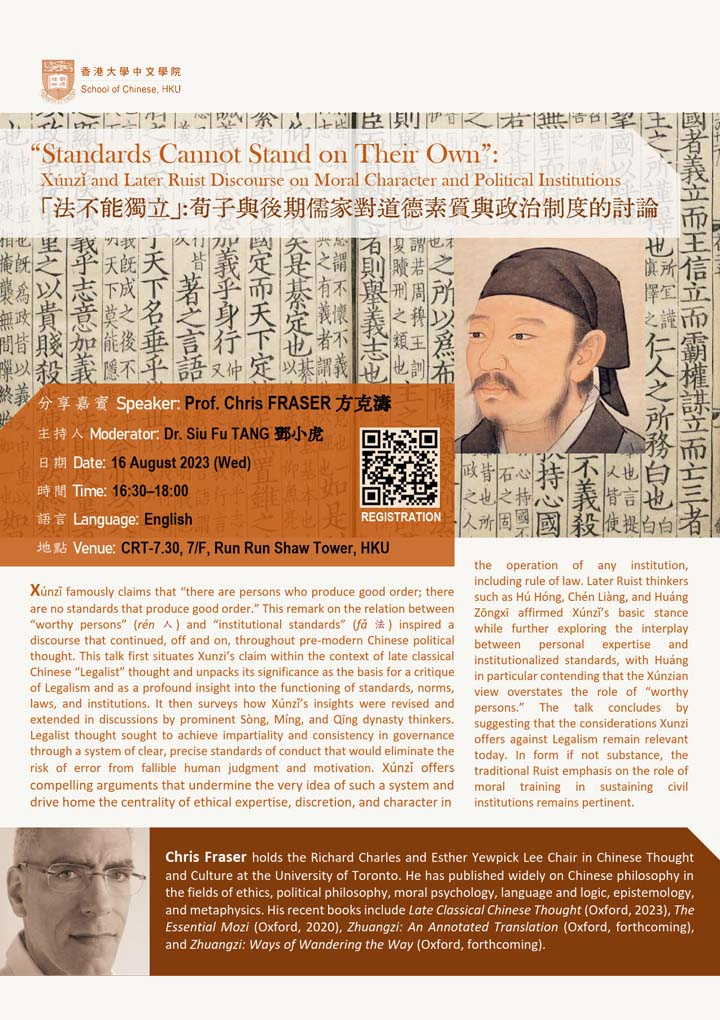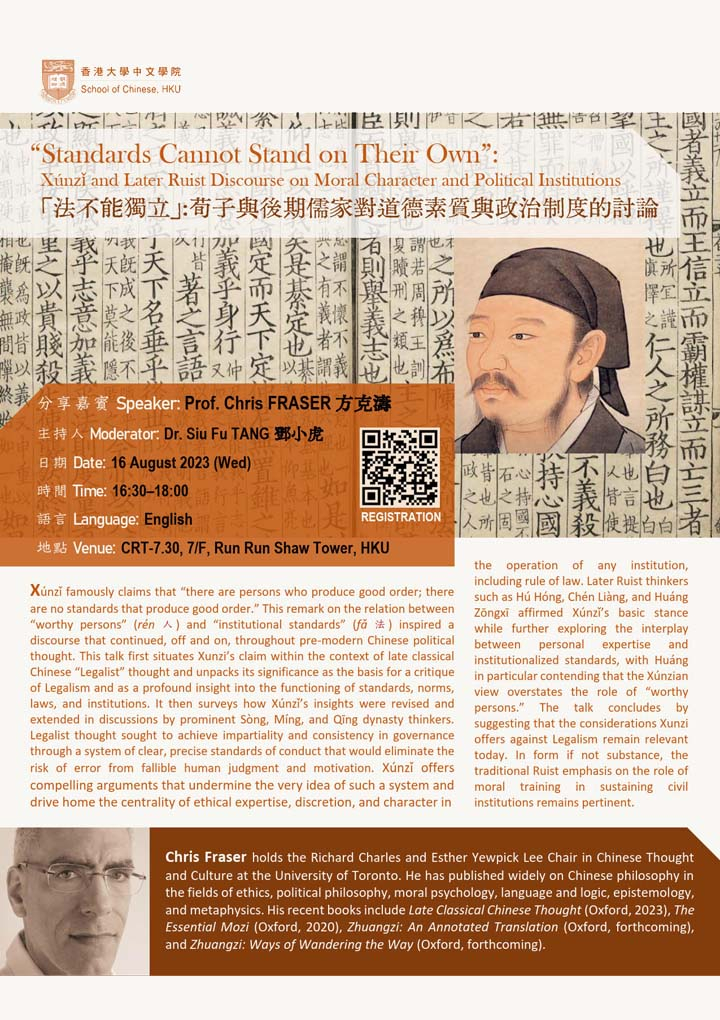[活動回放]“Standards Cannot Stand on Their Own”: Xúnzǐ and Later Ruist Discourse on Moral Character and Political Institutions 「法不能獨立」: 荀子與後期儒家對道德素質與政治制度的討論

*******************************************************************
School of Chinese Seminar
“Standards Cannot Stand on Their Own”:
Xúnzǐ and Later Ruist Discourse on Moral Character and Political Institutions
「法不能獨立」:荀子與後期儒家對道德素質與政治制度的討論
Speaker: Prof. Chris FRASER 方克濤 (University of Toronto)
Moderator: Dr. Siu Fu TANG 鄧小虎 (HKU)
Date & Time: August 16, 2023 (Wed) 16:30-18:00pm
Language: English
Venue: CRT-7.30, 7/F, Run Run Shaw Tower, Centennial Campus, HKU
Link of Zoom meeting:
https://hku.zoom.us/j/92859034354?pwd=alo2aWl1MWpGTkhIYmx2RFl2NnNnQT09
Meeting ID: 928 5903 4354
Password: 866830
Xúnzǐ famously claims that “there are persons who produce good order; there are no standards that produce good order.” This remark on the relation between “worthy persons” (rén 人) and “institutional standards” (fǎ 法) inspired a discourse that continued, off and on, throughout pre-modern Chinese political thought. This talk first situates Xunzi’s claim within the context of late classical Chinese “Legalist” thought and unpacks its significance as the basis for a critique of Legalism and as a profound insight into the functioning of standards, norms, laws, and institutions. It then surveys how Xúnzǐ’s insights were revised and extended in discussions by prominent Sòng, Míng, and Qīng dynasty thinkers. Legalist thought sought to achieve impartiality and consistency in governance through a system of clear, precise standards of conduct that would eliminate the risk of error from fallible human judgment and motivation. Xúnzǐ offers compelling arguments that undermine the very idea of such a system and drive home the centrality of ethical expertise, discretion, and character in the operation of any institution, including rule of law. Later Ruist thinkers such as Hú Hóng, Chén Liàng, and Huáng Zōngxī affirmed Xúnzǐ’s basic stance while further exploring the interplay between personal expertise and institutionalized standards, with Huáng in particular contending that the Xúnzian view overstates the role of “worthy persons.” The talk concludes by suggesting that the considerations Xunzi offers against Legalism remain relevant today. In form if not substance, the traditional Ruist emphasis on the role of moral training in sustaining civil institutions remains pertinent.
Chris Fraser holds the Richard Charles and Esther Yewpick Lee Chair in Chinese Thought and Culture at the University of Toronto. He has published widely on Chinese philosophy in the fields of ethics, political philosophy, moral psychology, language and logic, epistemology, and metaphysics. His recent books include Late Classical Chinese Thought (Oxford, 2023), The Essential Mozi (Oxford, 2020), Zhuangzi: An Annotated Translation (Oxford, forthcoming), and Zhuangzi: Ways of Wandering the Way (Oxford, forthcoming).
Notice:
1) The seminar will be conducted primarily in a face-to-face mode; Those who cannot attend the seminar in-person could apply for online participation (via Zoom) with justifications;
2) All those who would like to attend the seminar are required to register online (Click HERE) on a first-come, first-served basis;
3) Email of confirmation will be sent to the registered email addresses and participants have to show the screenshot or print-out version of the email for entry of the seminar venue;
4) Walk-in or late-comers will not be allowed for entry of the seminar venue unless situation allows.
ALL are welcome*
*Pre-registration (Click HERE) is requested.








